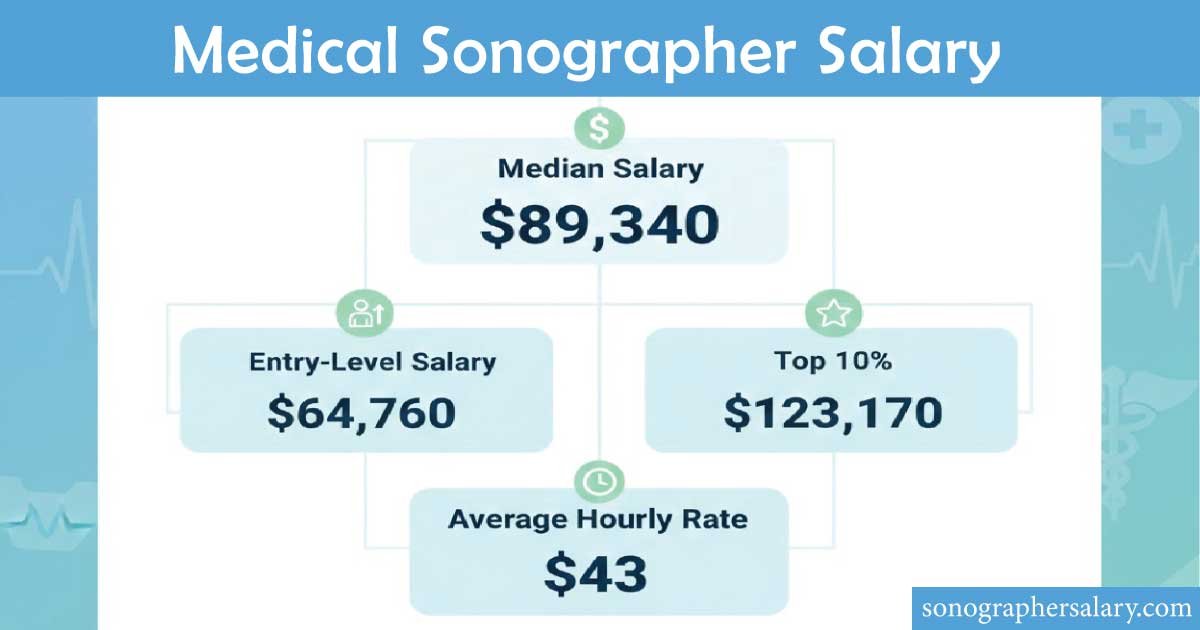A medical sonographer, also known as a diagnostic medical sonographer or ultrasound technologist, is a trained healthcare professional who uses specialized ultrasound equipment to create images of a patient’s internal organs, tissues, and blood flow. These images help physicians diagnose medical conditions and monitor ongoing treatments.
Medical sonography is one of the fastest-growing allied health careers, offering job security, meaningful work, and competitive compensation. In this guide, we will explore average salaries, salary factors, state-wise pay differences, work setting variations, and career growth opportunities.
National Average Medical Sonographer Salary
Medical sonographers are highly valued healthcare professionals who are well-compensated for their expertise. Their salaries reflect not only the advanced technical skills required to operate sophisticated ultrasound equipment but also the importance of their certifications, attention to detail, and the critical responsibility they hold in assisting physicians with accurate diagnoses and patient care.
📌 Median Salary: $89,340 per year
📌 Hourly Rate: $43 per hour on average
📌 Top 10% Earners: $123,170+ per year
📌 Entry-Level (10th percentile): $64,760 per year
National Salary Overview Table
| Salary Metric | Annual Salary | Hourly Wage |
|---|---|---|
| Median | $89,340 | $43 |
| Entry-Level (10th percentile) | $64,760 | $31 |
| Top 10% | $123,170 | $59 |
| Average | $89,340 | $43 |
Note: Median salary represents the middle of the pay range, providing a more accurate depiction than the average, as it reduces the effect of unusually high or low salaries.
Also Read: Travel Sonographer Pay: Hourly, Weekly & Annual
Salary by Experience Level
Experience greatly influences a sonographer’s salary. As professionals gain hands-on expertise, advanced skills, and additional certifications, their value in the healthcare field rises, leading to higher pay, greater responsibilities, and opportunities for career advancement.
| Experience Level | Annual Salary | Description |
|---|---|---|
| Entry-Level (0-2 years) | $62,000 – $68,000 | Recent graduates or those just entering the field. |
| Mid-Level (3-7 years) | $74,000 – $85,000 | Experienced professionals, may hold certifications in multiple specialties. |
| Senior/Experienced (8+ years) | $90,000 – $105,000+ | Highly skilled sonographers, often with management or supervisory responsibilities. |
Insight: Pursuing additional certifications like cardiac, vascular, or obstetric sonography can significantly boost earnings.
Salary by Work Setting
Medical sonographers are employed across diverse healthcare settings, including hospitals, clinics, and diagnostic centers. Their salaries vary based on the facility type, the volume and complexity of patients they handle, and any specialized areas of expertise they possess.
| Work Setting | Annual Salary Range | Notes |
|---|---|---|
| Hospitals | $75,000 – $85,000 | Typically offer benefits and more stable hours. |
| Outpatient Care Centers | $85,000 – $95,000 | Often pay more due to higher specialization and patient load. |
| Physicians’ Offices | $80,000 – $90,000 | Smaller facilities, sometimes flexible scheduling. |
| Diagnostic Laboratories | $75,000 – $82,000 | Routine imaging, fewer emergencies. |
| Specialty Clinics (Cardiology, OB/GYN) | $85,000 – $98,000 | High specialization often commands higher salaries. |
Tip: Choosing a specialized practice like cardiology or vascular sonography can increase your earning potential.
Also Read: Abdominal Sonographer Salary: What to Expect
Salary by Geographic Location
Medical sonographer salaries differ significantly between states and cities, largely due to variations in cost of living, regional demand for skilled professionals, and the concentration of healthcare facilities, with urban areas and high-demand regions typically offering higher compensation.
Top Paying States (Annual Salary)
| State | Average Salary | Notes |
|---|---|---|
| California | $102,000 | High demand, cost of living is high. |
| New York | $98,500 | Urban centers like NYC increase earning potential. |
| Massachusetts | $97,000 | High average, good benefits. |
| Texas | $91,500 | Large hospitals and outpatient centers. |
| Florida | $89,000 | Growing demand, moderate cost of living. |
Top Paying Cities (Annual Salary)
| City | Average Salary |
|---|---|
| San Francisco, CA | $115,000 |
| New York, NY | $105,000 |
| Boston, MA | $102,000 |
| Los Angeles, CA | $101,000 |
| Seattle, WA | $98,000 |
Observation: Urban centers and states with higher costs of living often pay more, but competition may also be greater.
Hourly Wage and Salary Percentiles
In addition to annual salaries, medical sonographers may earn an hourly wage, especially when working in outpatient clinics, diagnostic centers, or as travel sonographers. Hourly pay provides flexibility and can sometimes offer higher rates for specialized or short-term assignments.
| Percentile | Annual Salary | Hourly Rate |
|---|---|---|
| 90th | $117,736 | $56+ |
| 75th | $108,640 | $52 |
| Median | $98,649 | $47 |
| 25th | $89,180 | $43 |
| Entry | $80,558 | $39 |
Travel sonographers may earn more hourly but usually do not receive full benefits. This is ideal for professionals seeking higher pay and flexibility.
Also Read: Breast Sonographer Salary: Pay, Benefits & Growth
Bonuses, Benefits, and Other Compensation
In addition to their base salary, medical sonographers often receive various forms of additional compensation, including annual bonuses, overtime pay, shift differentials, health and retirement benefits, reimbursement for continuing education, and other incentives that enhance their overall earnings and job satisfaction.
Annual bonuses: $1,000 – $5,000
Overtime pay: Especially in hospitals
Health insurance and retirement benefits: Common in hospitals and larger outpatient centers
Continuing education reimbursement: Encourages certification growth
Shift differentials: Evening or night shifts often pay more
These additional benefits can increase total compensation by 10–20% annually.
Factors Affecting Medical Sonographer Salary
Medical sonography is a highly specialized healthcare career that combines technical expertise with patient care. Salaries for sonographers reflect their education, skills, experience, and workplace environment, making this profession both rewarding and financially competitive in the healthcare industry.
1- Education & Certifications:
A sonographer’s education level and certifications greatly influence salary. While an associate degree allows entry into the field, a bachelor’s degree often leads to higher pay and advancement opportunities. Additional specialty certifications, such as cardiac, vascular, or obstetric sonography, can significantly increase earning potential and career prospects.
2- Experience:
Experience is a key determinant of a sonographer’s salary. Entry-level professionals earn less, while those with several years of hands-on experience, advanced skills, and supervisory responsibilities typically earn higher wages. Gaining expertise across multiple specialties or high-volume clinical settings further enhances compensation and career growth opportunities.
3- Work Setting:
The type of facility a sonographer works in impacts their salary. Hospitals often provide stable pay and benefits, whereas outpatient centers or specialty clinics may offer higher salaries due to increased patient volume or advanced procedures. Choosing the right work setting can strategically boost income and professional development.
4- Geography :
Location plays a major role in sonographer compensation. Urban areas and states with higher costs of living generally pay more to attract skilled professionals. Conversely, rural or less populated regions may offer lower salaries. Local demand, healthcare infrastructure, and regional economic conditions all influence overall earnings for sonographers.
5- Shift & Hours:
Shift timing and workload affect earnings. Sonographers who work evenings, nights, weekends, or take on on-call responsibilities often receive higher pay due to shift differentials. Overtime opportunities in busy hospitals or clinics can significantly increase annual income, making flexible scheduling and willingness to work extended hours financially rewarding.
Career Outlook and Salary Growth
Medical sonography is one of the fastest-growing healthcare professions, with a projected job growth of 14% between 2024 and 2034. This growth rate is significantly higher than the average for all occupations, reflecting increasing demand for diagnostic imaging, an aging population, and the expanding need for skilled sonographers in hospitals, clinics, and specialized medical centers.
Reasons for growth:
- Aging population requiring more diagnostic imaging
- Increased focus on preventive healthcare
- Expansion of outpatient imaging centers
With experience, certifications, and specialization, medical sonographers can see steady salary growth, potentially exceeding $120,000 in specialized or management positions.
Also Read: Pediatric Sonographer Salary in New York- Latest
Tips for Maximizing Salary
Focusing on high-demand specialties such as cardiology, vascular, or obstetric sonography can significantly increase a sonographer’s earning potential. These fields require advanced skills and certifications, making professionals more valuable to employers. Specialization not only boosts salary but also opens opportunities for career growth and leadership roles in specialized departments.
1- Gain Experience in Busy Urban Centers:
Working in large hospitals or major urban centers often results in higher pay due to greater patient volumes and complex cases. Urban hospitals may also provide access to advanced equipment and specialized procedures. Gaining experience in these environments enhances skills, credibility, and professional networks, which can translate into better compensation over time.
2- Pursue Advanced Certifications:
Obtaining advanced credentials such as RDMS (Registered Diagnostic Medical Sonographer), RVT (Registered Vascular Technologist), or RDCS (Registered Diagnostic Cardiac Sonographer) demonstrates expertise and professional credibility. Employers often reward certified sonographers with higher salaries and more responsibilities. Continuous learning and certification renewal are essential strategies for maximizing income and career advancement.
3- Consider Travel or Per-Diem Roles:
Travel or per-diem sonographer positions provide flexibility and higher pay rates, particularly in high-demand regions. Short-term contracts often include premium compensation, housing stipends, and travel allowances. These roles allow sonographers to gain diverse clinical experience, build professional networks, and strategically increase annual earnings beyond traditional hospital or clinic positions.
4- Negotiate Pay & Benefits:
Effective negotiation can significantly impact a sonographer’s total compensation. Candidates should emphasize experience, certifications, and specialized skills when discussing salary. Don’t accept the first offer without evaluating benefits, overtime opportunities, and shift differentials. Strategic negotiation ensures fair pay, enhances long-term earnings, and may include additional perks like education reimbursement or retirement contributions.
Summary Table: Medical Sonographer Salary by Factor
| Factor | Range/Salary |
|---|---|
| Median National Salary | $89,340 |
| Entry-Level | $64,760 – $68,000 |
| Top 10% | $123,170+ |
| Hourly Rate | $39 – $59 |
| Highest Paying States | CA, NY, MA |
| Work Settings with Highest Pay | Specialty Clinics, Outpatient Centers |
| Bonuses/Additional Pay | $1,000 – $5,000 + overtime & shift differentials |
| Certifications Boost | $5,000 – $15,000 potential increase |
Conclusion
A career as a medical sonographer offers both professional fulfillment and excellent financial rewards. Sonographers play a crucial role in diagnosing and monitoring patients, making their work highly meaningful. With competitive salaries averaging around $89,340 per year, top earners can exceed $120,000 annually, especially in specialized areas like cardiology or vascular sonography and in urban centers. Additional certifications and accumulated experience further boost earning potential. Flexible work settings, strong job growth, and ongoing demand make this profession highly attractive. For anyone seeking a stable, rewarding healthcare career, medical sonography provides both meaningful patient impact and financial stability

Zak is a dedicated medical and career writer specializing in sonography, healthcare education, and professional development. Through SonographerSalary.com, he shares in-depth insights on sonographer salaries, education pathways, and career tips to help readers build successful futures in medical imaging. His content combines accuracy with practical, easy-to-understand guidance, empowering students and professionals to make confident, informed career decisions.

